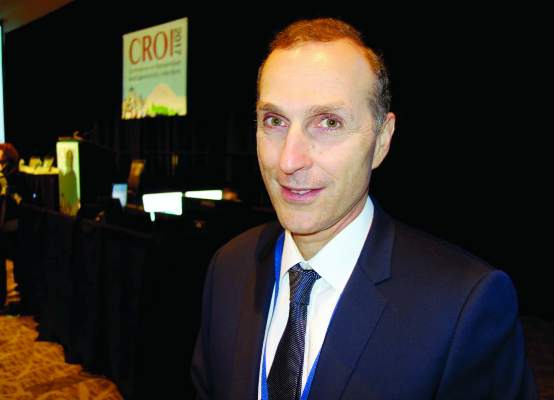AT CROI 2017
SEATTLE (FRONTLINE MEDICAL NEWS) – When men who have sex with men were given doxycycline and told to take it after unprotected sex, the incidence of sexually transmitted infections dropped 47% over about 9 months in France.
“We were quite surprised to see” such a strong effect , especially since it was achieved with “a very low use of doxycycline, less than two pills per week” among the 232 men in the study, said lead investigator Jean-Michel Molina, MD, of St. Louis Hospital, Paris.
Gonorrhea in France is largely resistant to doxycycline; the results were due to a robust drop in new syphilis and chlamydia cases.
Sexually transmitted infections (STIs) are especially high among men who have sex with men (MSM), and several of the physicians in Dr. Molina’s audience were glad to hear of an intervention that puts a dent in a difficult problem. Even so, he stressed repeatedly that prophylactic antibiotics for STIs aren’t ready for general practice; the concern is inducing resistance by a too-liberal use. He and his team are analyzing samples they collected for emerging resistance.
“We need to be careful,” Dr. Molina said “these are results from a limited number of people” with short follow-up. “We need more research,” he added.
However, with such low antibiotic pressure, less than two pills a week, resistance might be unlikely. Syphilis and chlamydia might also be less likely to build resistance than gonorrhea, he noted.
All the subjects were in a post-exposure HIV prophylaxis trial. Given the risk of STIs in that setting, it “was a great opportunity to” study the intervention, Dr. Molina said.
His team randomized 116 men to take two 100 mg pills of doxycycline within 72 hours of condomless sexual intercourse, without exceeding six pills per week. They were given enough pills to cover their exposures from unprotected sex, so they didn’t have to make frequent visits to the study clinic. The other 116 men were randomized to observation.
Men in both groups came in every 8 weeks for HIV and syphilis serology tests, and PCR tests of urine and anal and oral swabs for chlamydia and gonorrhea. The median follow-up was 8.7 months.
Twenty-eight patients in the doxycycline group caught a new STI (24%, 37.7 events per 100 patient years) versus 45 in the observation arm (38.8%, 69.7 events per 100 patient years). Doxycycline prophylaxis almost halved the risk (HR 0.53, 95% CI 0.33-0.85, P = .008). More than two-thirds of the infections in both groups were asymptomatic.
The doxycycline group took a median of seven pills/month; eight patients (7%) stopped using the drug due to gastrointestinal side effects.
There was no significant change in sexual behavior in the study arms. Both groups reported a median of about 5-10 sexual partners at each 2 month follow-up visit, and most reported anal sex without a condom. The men were an average of about 40 years old.
Dr. Molina is a consultant for Merck and Viiv, and a speaker and researcher for Gilead, which was one of several funders of the work.
On Twitter @IDPractitioner





